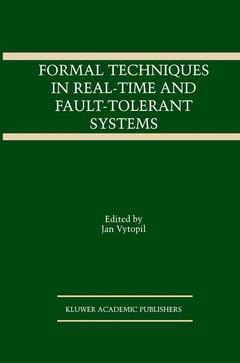Description
Formal Techniques in Real-Time and Fault-Tolerant Systems, Softcover reprint of the original 1st ed. 1993
The Springer International Series in Engineering and Computer Science Series, Vol. 221
Coordinator: Vytopil Jan
Language: English
Subjects for Formal Techniques in Real-Time and Fault-Tolerant Systems:
Keywords
Hardware; Text; development; formal method; formal specification; modeling; verification
Publication date: 09-2012
208 p. · 15.5x23.5 cm · Paperback
208 p. · 15.5x23.5 cm · Paperback
Description
/li>Contents
/li>
Formal Techniques in Real-Time and Fault-Tolerant Systems focuses on the state of the art in formal specification, development and verification of fault-tolerant computing systems. The term `fault-tolerance' refers to a system having properties which enable it to deliver its specified function despite (certain) faults of its subsystem. Fault-tolerance is achieved by adding extra hardware and/or software which corrects the effects of faults. In this sense, a system can be called fault-tolerant if it can be proved that the resulting (extended) system under some model of reliability meets the reliability requirements.
The main theme of Formal Techniques in Real-Time and Fault-TolerantSystems can be formulated as follows: how do the specification, development and verification of conventional and fault-tolerant systems differ? How do the notations, methodology and tools used in design and development of fault-tolerant and conventional systems differ?
Formal Techniques in Real-Time and Fault-Tolerant Systems is divided into two parts. The chapters in Part One set the stage for what follows by defining the basic notions and practices of the field of design and specification of fault-tolerant systems. The chapters in Part Two represent the `how-to' section, containing examples of the use of formal methods in specification and development of fault-tolerant systems.
The book serves as an excellent reference for researchers in both academia and industry, and may be used as a text for advanced courses on the subject.
The main theme of Formal Techniques in Real-Time and Fault-TolerantSystems can be formulated as follows: how do the specification, development and verification of conventional and fault-tolerant systems differ? How do the notations, methodology and tools used in design and development of fault-tolerant and conventional systems differ?
Formal Techniques in Real-Time and Fault-Tolerant Systems is divided into two parts. The chapters in Part One set the stage for what follows by defining the basic notions and practices of the field of design and specification of fault-tolerant systems. The chapters in Part Two represent the `how-to' section, containing examples of the use of formal methods in specification and development of fault-tolerant systems.
The book serves as an excellent reference for researchers in both academia and industry, and may be used as a text for advanced courses on the subject.
I Concepts and Foundations.- 1 Terminology and Paradigms for Fault Tolerance.- 2 Fault Tolerance as Self-Similarity.- 3 Parameterized Semantics for Fault Tolerant Real-Time Systems.- 4 Modeling Real-Time and Reliability.- II Applications.- 5 A Fault-Masking and Transient-Recovery Model for Digital Flight-Control Systems.- 6 Specification and Verification of Recovery in Asynchronous Communicating Systems.- 7 CSP, Formal Software Engineering and the Development of Fault-Tolerant Systems.
© 2024 LAVOISIER S.A.S.



